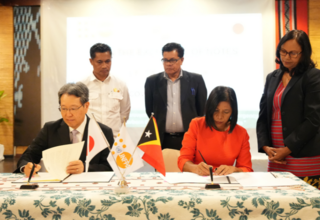With those words Father Agostinho Soares, The Representative of the Vicar Episcopal of Dili Diocese, told an enthralled audience at the 21-22 September National Conference on Reproductive Health-Investment in women's health is investment for Timor-Leste's bright future that the time is now to talk about sex education. The conference, organized by the Grupo das Mulheres Parlamentares de Timor-Leste (GMPTL) [Timor-Leste Group of Women Parliamentarians] brought together nearly 200 parliamentarian, government officials and representatives of civil society to build consensus amongst key stakeholders to develop a Road Map for Action for 2016-2019 for Sexual and Reproductive Health in Timor-Leste.
Timor-Leste is the seventh most youthful populations in the world, with 42 percent of the population under the age of 15 and an additional 20 percent of the population aged 15 to 24. Every young person will one day have life-changing decisions to make about their sexual and reproductive health. Yet research shows that the majority of adolescents and young people lack the knowledge required to make those decisions responsibly, leaving them vulnerable to coercion, sexually transmitted infections and unintended pregnancy. Half of the young people in Timor-Leste do not have and accurate knowledge about how to get pregnant and many do not know that pregnancy can be the result of having sex only once. Nearly one quarter (24 percent) of women aged 20-24 years give birth by age 20.
In her remarks to participants, Ms. Suneeta Mukherjee, former UNFPA Country Representative in Bangladesh, Sri Lanka and the Philippines highlighted that Comprehensive Sexuality Education (CSE) enables young people to make informed decisions about their sexuality and health. CSE has demonstrated impact in terms of improving knowledge and self-esteem, changing attitudes, gender and social norms, and building self-efficacy. Evidence shows that CSE does not encourage sexual behaviour, but rather encourages informed and responsible behaviour when it comes to reproductive health and relationships.
At the closing session, Members of Parliament presented their recommendations in a final Act of the Conference. The document highlighted the need to do a study on the causes of teenage pregnancy, the need to pass a re-entry policy for pregnant girls to allow them to return to school following a delivery, the need for secondary school curriculum reform in favour of CSE, including in catholic schools, the need to make Sexual and Reproductive Health a priority programme for the country and the need to quality implementation of the school curriculum on sexual and reproductive health from primary to secondary education level.
Written by Mr. John M. Pile, UNFPA Representative



